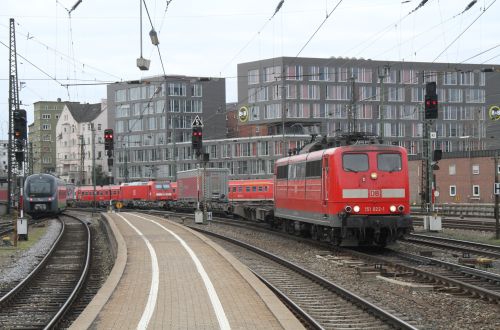A feasibility study will be conducted for the joint development and eventual purchase of 100 new 800kW four-axle hybrid locomotives. DB Cargo says the first test locomotives are expected to be ready by the end of 2019.
“The hybrid vehicles will be used as short-range locomotives and, in addition to significantly lower diesel consumption and lower maintenance costs, will enable a higher average fleet availability,” DB Cargo says. DB Cargo’s shunting locomotive fleet has an average age of 40 years and is at the end of its useful life.
“The objective is to promote the development of the supplier market for freight locomotives and components in cooperation with Toshiba,” says Mr Jürgen Wilder, chairman of the management board of DB Cargo. “This will provide DB Cargo with access to sunrise technologies that are not currently available in this form in our home market. In return, we - as the largest rail freight operator in Europe - can pave the way for Toshiba to enter the European market. In other words, this is a classic win-win situation.”
DB Cargo has also agreed the sale of 200 older six-axle 15kV ac class 151 and 155 electric locomotives to a consortium led by leasing firm Railpool with Toshiba. The locomotives will then be leased to both DB Cargo and other rail freight operators.
The class 151 locomotives were built for the former German Federal Railway between 1972 and 1978 while the class 155 units were built in East Germany for German State Railway (DR) by LEW at Hennigsdorf between 1977 and 1984. The value of the transaction has not been disclosed although press reports suggest it is around €70m.
DB Cargo says that creating this privately-owned pool of its older locomotives will give it the chance to lease locomotives efficiently in line with changing demand. DB will remain responsible for maintenance.
DB Cargo is also understood to be evaluating the sale and lease back of its fleet of over 70,000 freight wagons as part of the process of improving profitability.
“The pace of innovations in the rail freight business is slowing down and competition is low as many European manufacturers have discontinued their activities in this sector,” DB Cargo says. “Nevertheless, the leading Asian technological players have still not succeeded in gaining a hold on the European market. This is attributable primarily to their insufficient experience of European rail operations, the complicated approval procedures, and the lack of suitable partners. DB Cargo seeks to overcome these obstacles in a collaboration with Toshiba to make the European market for rail vehicle technology a more attractive proposition for the future.”
For more information on the global locomotive fleet market, subscribe to IRJ Pro.

